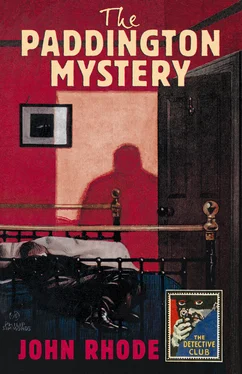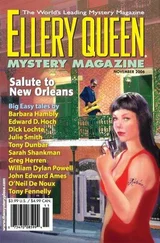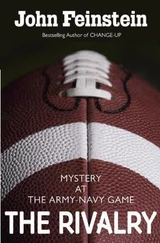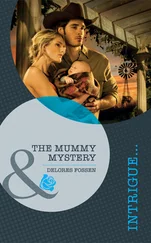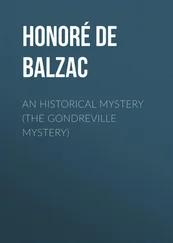‘Quite, sir,’ replied Harold. So much had been revealed at the inquest.
‘Very well. Now to deal with the body itself. The result of examination showed it to be that of an elderly man, probably between fifty and sixty, clean-shaven, hair cut short—no easily identifiable distinguishing marks. He was apparently particular as to his personal appearance, his hair, which was turning grey, had recently been treated with some preparation designed to mask this greyness Against this, however, may be set the fact that his teeth had been neglected, and showed considerable signs of decay. His hands, on the contrary, were quite well kept, and bore no traces of manual labour.
‘He was dressed in a remarkably tight-fitting blue serge suit, beneath which he wore underclothing bearing no laundry mark or trade description. This underclothing was distinctly light in texture for the time of year, a point to be noted in connection with the fact that he was apparently wearing no overcoat. The suit itself, though worn and far from new, was well-cut and probably made by an efficient tailor. It is particularly interesting, in view of the fact that the underclothing bore no marks of any kind, that this suit had been turned, turned inside out, that is to say, by an expert in these matters, and fitted with plain bone buttons. The man’s boots were standard black-laced boots, of a well-known make. The most curious thing about them was that they were unusually tight-fitting, although worn over thin socks. No hat or cap of any kind was found.’
The Professor leaned back in his chair after the enumeration of these points, and looked keenly at Harold.
‘Eliminating details, I think I have touched upon the essential facts connected with the man and his clothing,’ he said. ‘I deal with these first, as up to the present he remains unidentified, although, unlike the police, I consider the question of his identity of secondary importance. Now, so far as I have gone, have you anything to add?’
‘Nothing, sir, except as regards the contents of his pockets,’ replied Harold, who had been following the Professor’s incisive words with keen attention.
‘I am coming to that,’ said the Professor. ‘Do not let us confuse our classification of facts. From what we have seen so far, the police have deduced that the deceased was a non-manual worker, of limited means, compelled to maintain as decent an appearance as possible. In fact, a clerk of some kind or a burglar. Do you agree with this deduction?’
‘I think so, sir,’ replied Harold. ‘But since you have put the facts as you have, it seems odd that all means of identification by the man’s clothing were lacking. That hadn’t struck me so forcibly before.’
‘Humph!’ grunted Professor Priestley. ‘The usual failure to attach equal importance to every ascertainable fact, whether it appears relevant or not. I can hardly blame you, since this failing is common among men whom the world acclaims as trained scientists. But to continue. You spoke of the contents of the man’s pockets. These were, I believe, as follows. A sum of one pound sixteen shillings and fourpence, made up of one pound and one ten-shilling note, two half-crowns, a shilling, three pennies, and two half-pennies, carried loose, that is to say, not in a purse or wallet. A nickelled steel tyre-lever, nine inches long, carried in the inside breast pocket, apparently quite new, and bearing the trade-mark of Motor Gadgets, Ltd., which is the steering-wheel of a motor-car. Besides this, half a dozen washers and nuts, showing various signs of wear, and odd parts of the valve of a motor-car tyre—these last all carried loose in the side pockets of the coat.
‘Now observe once more that none of these things are of any assistance to identification. Treasury notes and coins are common currency, nobody dreams of noting the numbers of the notes which pass through his hands. Motor Gadgets, Ltd., are a big combine of manufacturers; this particular type of tyre lever is a standard article of theirs, and can be bought at any garage. Stray bolts, nuts, and parts of valves cannot, under ordinary circumstances, possibly be traced. You agree with me so far, I suppose?’
‘Yes, sir,’ replied Harold. ‘There’s just one thing about them, though. Taken together, they point to the man being in some way connected with motors in some form.’
‘Thus to some extent controverting the clerk or burglar theory,’ agreed the Professor. ‘But a man who carries parts of a car about in his pockets is more likely to be a mechanic or chauffeur than a clerk in a garage, say. Now there are two points about this man which seem to render it unlikely that he had the actual handling of any machinery. The first is the state of his hands in general, and the fact that there was not the slightest trace of ingrained grime in the finer lines of his fingers in particular. That ingraining is remarkably persistent, as anyone who handles machinery will tell you. The second point is that there was no trace of oil or grease stains on his clothing. You may object that he never went near the machinery in the suit he was wearing when you found him. But still I maintain that oil particularly has a way of penetrating to the underclothing, and in this case the vest and drawers bore no signs of it.’
‘How in the world do you know all this, sir?’ exclaimed Harold in amazement. ‘Nothing nearly so detailed came out at the inquest!’
Professor Priestley smiled indulgently. ‘It seems that I have to some extent betrayed myself,’ he replied. ‘I had not meant to inform you of the fact at this stage, but Inspector Hanslet is a friend of mine. He is a man of very wide interests, as befits an officer charged with such important duties, and two or three years ago he happened to read a paper of mine on Methods of Psychological Deduction, in which, I venture to say, I succeeded in refuting some very widely-accepted theories. But no matter. Since that time he has often called upon me to ask my assistance in the correlation of scattered facts. I approached him three or four days ago, and he very willingly went over the case with me. He was very much interested in it then, although I expect that the verdict of the coroner’s jury has now allayed his anxiety. I did not, of course, tell him that I was in any way interested in you.’
Harold gave a gasp of astonishment. The idea of this militant mathematician taking an interest in criminal cases was so novel that it seemed absurd. Mathematics was to him merely a jumble of queer signs and Greek letters; he had never considered it as a science applicable to human events.
‘However,’ continued the Professor, after a pause, ‘that is by the way. The point I wish to make is that up to the present we have discovered nothing of great assistance towards establishing the identity of the deceased. We will now turn to a matter of even greater interest, and that is the cause of the man’s death.
‘You will remember that by your own statement the first thing that struck you was that the man’s clothes were soaking with water. Investigation showed that the bed where he was lying was also very wet. The bed was in such a position that rain cannot have blown upon it from the window, and there was no sign of a leakage in the roof. Either, then, the man’s clothes were soaked when they entered the room, or they were deliberately wetted after arrival. The fact that the carpet of the room showed signs of moisture is compatible with either theory. We must remember that, although there appears to be evidence of the source of the water, this evidence is not necessarily conclusive.’
‘But surely,’ interrupted Harold, ‘the tracks leading up from the canal—’
The Professor held up a protesting hand. ‘Let us wait until we come to that point,’ he said. ‘We are not at present considering how the body gained access to your rooms. Having established the condition of the corpse when found, that is, soaked with moisture and lying on its back on your bed, we come to the cause of death.
Читать дальше
